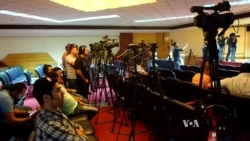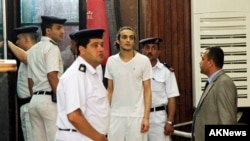After Egypt freed imprisoned al-Jazeera journalists and others late last month, President Abdel Fattah el-Sissi said his country now enjoys full press freedom.
“I don’t want to exaggerate,” he said, “but we have unprecedented freedom of expression in Egypt. No one in Egypt can bar anyone working in the media.”
But activists say the speech was made simply to appease Western critics, and has little relation to reality. Some journalists remain imprisoned, according to the Egyptian Journalist Syndicate, and the president’s decision to release some jailed reporters doesn’t go far enough to prevent further erosion of freedom of expression in Egypt.
“Protecting journalists doing their work instead of arresting them or attacking them — these would be real positive steps,” said Khaled Elbalshy, a senior member of the Journalist Syndicate. “Not just make a show of reform by releasing famous journalists.”
Dozens of reporters are in jail, according to Elbalshy and several news sources are either banned, or heavily censored. Among those in prison now is Mahmoud Abou Zeid, also known as "Shawkan," a photographer who has been locked up for more than two years.
Shawkan was arrested in August, 2013, but, his trial date was finally set just last month for December. While he waits during the prolonged pre-trial detainment, his family says his health is rapidly deteriorating.
“His face is paler every time we visit. His sight is failing, and he can’t sleep from depression and sadness,” said Shawkan’s brother, Mohamed Abou Zeid in his Cairo home. “These and many other factors have led to his failing physical and psychological health.”
Shawkan worked for several media houses as a freelancer in Egypt, including Time Magazine and Demotix. He was arrested in a sweep of activists and journalists at the Rabaa protest in support of ousted Muslim Brotherhood President Mohamed Morsi.
Morsi is now in prison, sentenced to death and awaiting appeal. The protests against his ouster lasted more than a month and ended when police and army forces stormed the sit-in camp. Hundreds of protesters were killed. The Muslim Brotherhood has since been banned and deemed a terrorist organization.
Shawkan and his family claim no political affiliations, but among some Egyptians, anti-Muslim Brotherhood sentiment is so high that even reporting on the now-banned group is considered suspect.
“For those journalists, God knows if they sold their conscience or made a deal with the Muslim Brotherhood,” said Mohamed Abdulkhaleq, a Cairo barber. “And, as you know very well, the Brotherhood can brainwash people.”
Most activists and journalists detained at that time have since been released, including the al-Jazeera journalists and 100 others in late September.
When he heard about the release, Mohamed Abou Zeid said he was thrilled, sure that his brother would be on the list.
“When I didn’t see Shawkan’s name among them I was so saddened,” he said. “Frankly, I couldn’t believe it.”







